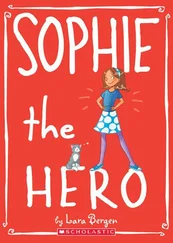Promise me you won’t call it ‘virtual grave,’ ” Vica said as they turned onto the West Side Highway.
“You were the one who hated ‘The Voice from the Grave’!” Sergey said.
“ ‘The Voice from the Grave’ is even worse. We can’t afford a name that’s a downer.”
“Well, the entire idea is about death. And death happens to be a downer,” Sergey said.
They had been discussing it the entire time in the car, all the way from their home on Staten Island to Vadik’s new apartment in Morningside Heights, and Vica was getting tired.
“You’re not getting it, are you?” she asked. “Death is a downer. But your app is about fighting death. That’s why you should be talking about immortality, not death. And don’t mention your Fyodorov either. Nobody’s ever heard of him.”
“He was the most original philosopher of the nineteenth century!”
“Nobody thinks so except for you!”
Sergey groaned and squeezed the steering wheel tighter.
He’d been steadily losing his looks for the last year or two. He used to be the handsomest guy in their circle. He had looked like a French movie star, like what’s-his-name — the guy from the Truffaut films. Now his angular features had become unsteady and incomplete, as if worn down by constant discontent, and even his wiry frame had become kind of unwired and clouded with fat. Vica had been watching the demise of his former splendor with mixed feelings. There were times when she felt sorry for him. There were times when she gloated. But mostly she felt cheated.
“How about calling it ‘No to Death’ or ‘No, Death, No’?” she asked.
“No, death, what?” Sergey started to laugh. His laugh was throaty and coarse and sounded a lot like a cough, a very bad cough. And it seemed to sputter resigned disapproval, as if he were trying to say that he found her disgusting and stupid, but that he was used to her and almost okay with it.
Vica hated his laugh so much that she wanted to kick him, but instead she turned away from him and fell silent.
She wished Vadik’s place weren’t so far away. But then everything was far from Staten Island. Regina lived in the most beautiful part of Tribeca. It would take her twenty minutes by taxi to get to Vadik’s. Vica wondered if Regina was already there.
They had all been friends in Russia. All four of them: Sergey and Vadik, then Regina, then Vica. Sergey and Vadik had met when they were sixteen and had had a hotly competitive friendship ever since. Vica didn’t quite understand their relationship but felt envious just the same, because she had never had anything like that with anybody. Regina had been Sergey’s girlfriend all through graduate school. Then Sergey left her for Vica, but Regina didn’t disappear from their group, because she had developed an intimate, completely unnatural friendship with Vadik. How can you have a platonic relationship with a man, Vica often wondered — especially a man like Vadik?
They’d all wanted to leave the country. Vadik, Sergey, and Regina had applied to several graduate schools in the United States. They were all smart — with Vadik the most flexible, Regina the most reflective, and Vica the most diligent, but Sergey was probably the smartest. He had gotten his Ph.D. in linguistics when he was twenty-four. And Sergey was the only one who had gotten accepted to an American graduate school, New York School of Business. This wasn’t exactly what he wanted, because he had been hoping to continue to study linguistics. But it was the only graduate program that offered him a free ride, and everybody said that NYSB was a great school. He and Vica had just gotten married, and they were going to America! Such amazing luck!
“Doesn’t it feel like we’re entering the afterlife?” Sergey had asked Vica on the plane to New York. “We’re leaving our lives behind and plunging into the unknown.”
Vica had had two years of her Moscow medical school left at the time, but they couldn’t stay and wait until she graduated. The idea had been that Vica would support them while Sergey was in school, and then after he found a good job, she would go to an American medical school to finish her studies. It was an American education that mattered anyway. For a while it was working out as planned. Vica received her license as an ultrasound technician, found a job at Bing Ruskin Cancer Center, which was the number one cancer center in the United States, and whatever was number one in the United States was clearly number one in the entire world as well. Sergey studied hard, got high grades, graduated with honors. Even the surprise pregnancy didn’t derail things. Vica had the baby, just as Sergey entered the job market. But who would have thought that he’d turn out to be such a loser at finding, and especially keeping, jobs? He had the mind of a scholar, not of a businessman. It was genetic. Both his parents and three of his grandparents were college professors. Five years ago, Sergey asked Vica if he could possibly go back to school to get his American Ph.D. so he could pursue an academic career. She’d been supporting him all those years, and now he wanted to spend more time studying? She wanted to smack him on the head, but all she said was “Excuse me?” And he said, “Forget it.” Now she kind of regretted it. He could have been more successful as an academic.
By the time Vadik made it to the United States (via an invitation to work as a computer programmer for a prestigious company in New Jersey), Sergey had been fired from yet another job at a bank and Vica had just realized that there was no chance that she would ever go back to school. Especially since they now had a child to support. Two children. “I have two children,” Vica loved to say, meaning both her son and her husband. And then two years ago Regina married the insanely rich Bob and moved to the United States as if to rub her newfound wealth in their faces. Bob had developed a supersuccessful start-up designing new mobile apps. It seemed like all around them people were developing Internet start-ups, building new applications, creating successful businesses out of thin air, getting rich overnight, just like that. Their Facebook pages were crowded with photos taken in the Alps, at Mexican all-inclusives, on African safaris, at their brand-new country houses. “Why not just post a pic of your bank account?” Vica complained to Sergey.
Bob’s company was called DigiSly. He’d already made millions. He’d been clever enough to find a unique niche and create apps designed to serve middle-aged people’s needs. One of the most popular DigiSly apps was called LoveDirect and it was designed to help grandmothers deal with their electronic picture frames. With LoveDirect, children and grandchildren sent photos from their phones directly to their grandmothers’ frames, the new images popping up automatically. All of Bob’s ideas were like that — unpretentious, practical, banal.
Regina had helped Vadik get a job at Bob’s company, and now he too made some serious bucks. Other people were getting rich off apps too. People they knew. Ordinary people like them, immigrants like them. Angela, Vica’s friend from medical school, had just launched a very successful app that allowed people to compare the side effects of various medications so that they could choose the least harmful one to take. Sergey’s old classmate Marik had created an app that would randomly insert smiley faces into your e-mails and texts, making you appear to be a warmer, more upbeat person. Stupid, right? But guess what? The app became superpopular. All of Vadik’s IT friends were bursting with different app ideas. So why couldn’t it happen for her and Sergey? Well, they didn’t work in the IT business, but they were surrounded by people who did. You didn’t have to be a computer programmer to come up with a viable idea. You just had to be smart. And Sergey wasn’t just smart, he had a spectacular mind. Wasn’t he repeatedly called a genius by their friends — and not always with irony? Didn’t they joke at the university that for Sergey brilliant ideas came as easily as farts?
Читать дальше












